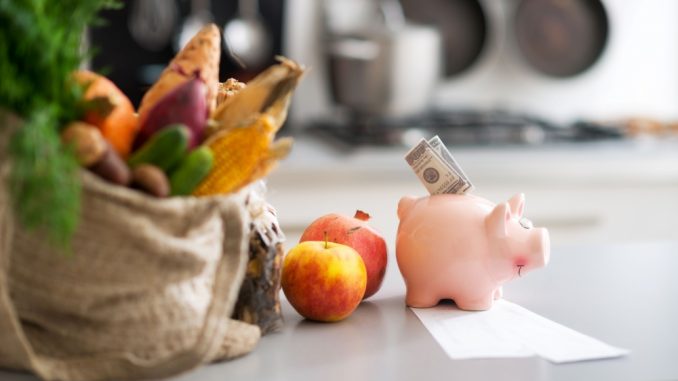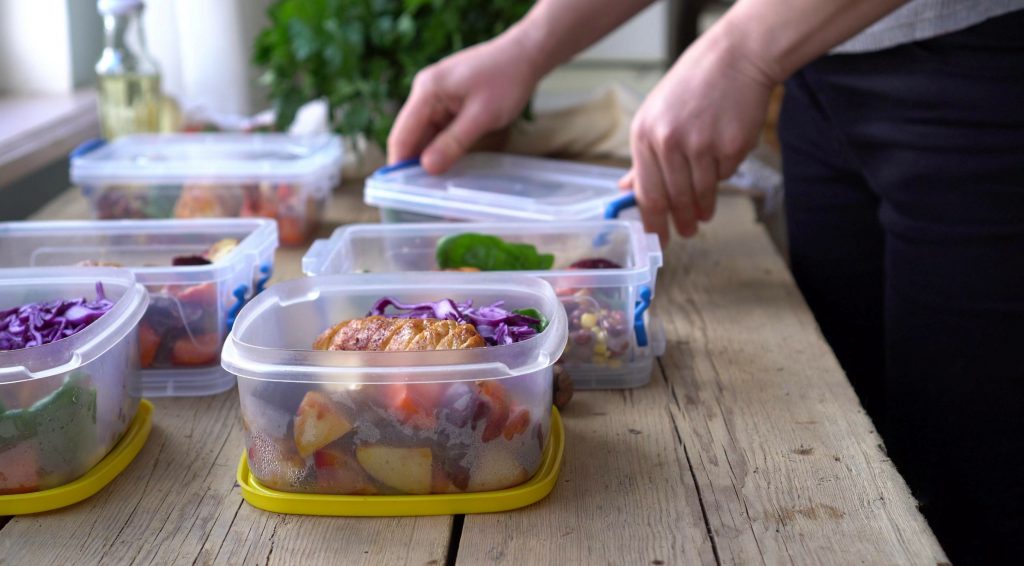
Putting dinner on the table every night may become a struggle for any parent, especially when you’re tight on time and money. With the cost of living continuing to rise, it’s become increasingly important for households to find ways to save money.
Fortunately, there are plenty of cost-saving tips available that won’t compromise your budget or reduce the quality of your life. Some of these strategies can help you improve your general financial health.
Cheap home meals and thrifty grocery shopping are just a few simple tricks that can help you save money on food every month.
If you’re looking for more ways to cut back on expenses in your kitchen, check out this list of useful suggestions guaranteed to help you keep more cash in your pocketbook.
1. Plan your meals ahead of time
Planning your meals ahead of time is one of the most important kitchen cost-saving tips. It helps you cut down the time you spend at the grocery store while helping you save both time and money. It can also make it easier to eat well and be healthy without having to think about it.
Some people think that meal-planning is only for those who have a lot of time on their hands. However, even those who work full-time can do it if they prioritize it.
Start by writing down what’s still in your pantry, fridge and freezer. This will help you identify things that need to be used up immediately. Once you’ve done that, make a list of everything you used up. This will help you see what you’ll need to restock on the next time you go to the store.
You can also ask your partner what they’d like to eat over the next few weeks. You can do this together while planning the meals you’ll make. This will also help you save time in the long run. You can also use meal-planning apps or websites to make the process easier. These will help you keep track of what you’re eating and make grocery shopping easier. You can also make it a group effort by asking your partner to help you out as well.
2. Shop with a grocery list
Once you’ve come up with a list of meals you want to cook, you’ll need to go shopping. This is where a handy grocery list will come in handy. This will help you stay on track and avoid buying things that aren’t on your list.
Shopping without a list can lead to impulse buys and more money spent. This will help ensure that you only buy what you need. You can use a notebook, your phone or an app to create a grocery list. This will make re-creating your list each time you go to the store easy. You can even email the list to yourself to make sure you don’t forget it at home.
By planning your meals and shopping with a list, you’ll avoid wasting food and money. You’ll also save time by not having to re-create your list each time you go to the store.
3. Freeze your leftovers
Every time you cook, you should try to save as much food as you can. This will help you reduce your food waste while also saving you money. You can use these leftovers to create new meals altogether.
You can also cut down on time spent cooking in the future by re-heating frozen meals from the previous night. This will also help you avoid wasting food if you’re running low on time.
All you need to do is freeze your leftovers in an airtight container and pop them in the microwave when you need them. You can also freeze your soups and stews if you made too much. This can be perfect for busy days that are forecasted to be colder.
Freezing your leftovers can save you both time and money. It also helps you avoid wasting food that could go bad before you have time to eat it all.
4. Change up your cooking habits
There are several ways you can change up your cooking habits to save both time and money. You can try to mix up what you eat and change the portion sizes if you’re finding yourself running out of food too quickly. You can also try to change the times that you make certain foods.
For instance, you can try to avoid making breakfast and lunch on the same day. This will allow you to only have to clean up once and make the process easier.
You can also try to change the way you cook your food. Try making baked and roasted dishes instead of using an oil-heavy fryer or deep fryer. This will not only help you cut down on costs but also on calories.
5. Install a timer
Yes, you can use a timer while cooking. This can help you stay on track and prevent yourself from over-or under-cooking your food. It can also help you avoid burning your food and wasting money.
If you have young children or are cooking for older relatives, a timer can also help you avoid burning anything. This is especially important for foods like cookies and cakes. You can use a timer to help you save both time and money.
There are a variety of timers available depending on what you need them for. If you’re cooking for your family every day, it’s a kitchen cost-saving idea that’s worth investing in.
6. Cook only what you need
Cooking only what you need can help you avoid wasting food and money. This is especially important for meat and fish.
You can use a meat thermometer to ensure that the meat is cooked thoroughly without over-cooking it. This will help you avoid food poisoning while also saving you money. It can also help you avoid wasting your food if you have a large family.
Cooking only what you need can help you avoid having leftovers that go bad before you have a chance to eat them. This can be especially helpful if you’re cooking for your family on a tight budget. It can also help you make room in your refrigerator so that you can store your leftovers better. This can save you time by not having to rearrange your fridge every time you want to use something.
7. Shop at wholesale stores
Whenever you can, try to shop at wholesale stores. This is especially true if you’re looking for fruits and vegetables. Some stores will have a produce section with items that are marked down. This can help you save a significant amount of money on your produce.
You can also try to shop at stores such as Costco if you have one nearby. They often sell food in bulk that can help you save money on groceries. You can try shopping for non-perishable items such as flour and spices at wholesale stores as well. This can help you save a significant amount of money on your grocery bills. It can also be helpful if you want to give yourself a challenge and try to buy everything at a wholesale store.
8. Utilize slow cookers and pressure cookers
Slow cookers can be a great alternative to a standard fryer or pan when cooking meat. This can not only help you save money on electricity but can also help you save money on your food bills.
You can use a slow cooker when you want to cook a meal that requires low heat. This is particularly helpful if you’re cooking something that needs to be in the oven for an extended period. It can also be helpful if you’re making something like baked beans.
Slow cookers are also a great option if you’re cooking for a large group of people. They’re also helpful for cooking on a tight budget because you can set the temperature low and leave the food for hours.
9. Buy in bulk
If there’s a bulk item that you use regularly, try purchasing it in bulk. This can help you save money on regular kitchen essentials such as salt, spices, and coffee.
Bulk buying is especially useful for items like grains, nuts, seeds, and legumes, which have a long shelf life. Items like flour, rice, and oats are also good to buy in bulk, as you can easily make them into different meals throughout the week.
You can also try to look out for sales or promotions on bulk items at the grocery store. This can help you save money on items such as paper towels, kitchen necessities, and cleaning supplies.
Bulk buying may not always be cheaper in the first place, but it will save you money in the long run by reducing the number of items you need to regularly buy.
You could also consider joining a bulk buying group. This is a group of people who regularly buy and share food in bulk to save money. You can find these groups online or in your local area.
10. Shop in season
Many produce items are cheaper when they’re in season. For example, bananas usually cost less during the summer, and avocados are typically cheaper in the fall. You can find a list of produce that’s in season throughout the year on your favourite store’s website.
Simply select the produce item you want to know more about, and the site will tell you when it’s in season. By buying produce that’s in season, you can reduce your grocery bill. Plus, you’ll get fresher produce that tastes better than imported produce.
You can also save money when buying produce by buying frozen vegetables. While fresh produce is usually best, frozen vegetables are frozen at the peak of freshness, which means they’re just as nutritious as their fresh counterparts. Frozen vegetables are also often cheaper than fresh produce.
11. Rotate your groceries
Many people make the mistake of buying groceries every week and letting them go to waste. By constantly purchasing new items, you run the risk of letting food go to waste. To reduce the amount of money you spend on food that ends up in the trash, try rotating your groceries.
Simply put, when you have an item that’s about to expire, eat it. You can also freeze it if you don’t want to eat it right away. When you have an item that’s about to spoil, get rid of it. Rotating your groceries is a simple way to make sure you don’t overspend on food.
The bottom line
For many families, eating at home is cheaper than going out to eat. But with rising food prices, it’s important to find ways to cut back on your grocery bill. Fortunately, there are lots of ways you can save money on groceries without sacrificing quality or nutrition.
From shopping at various stores and planning your meals to buying in bulk and shopping during off-peak times, these kitchen cost-saving ideas will help you save time and money in your kitchen.


